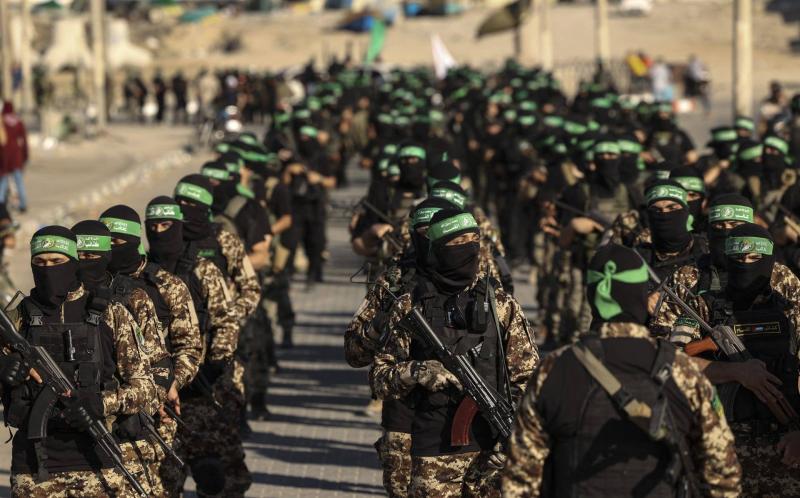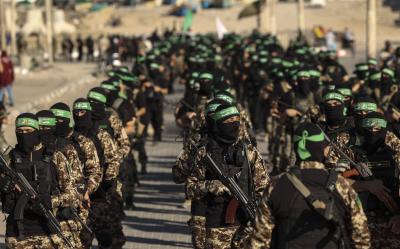The Palestinian Islamic Resistance Movement (Hamas) announced today, Saturday, that its fighters in Gaza are prepared to confront Israeli attacks "with full force" after the Israeli military expanded its air and ground assaults on the Gaza Strip. Hamas stated earlier that its fighters were engaged with Israeli forces in areas close to the border with Israel, following an intensification of Israeli attacks on Gaza.
Israeli military spokesman Admiral Daniel Hagari stated in a televised briefing last night, "In addition to the attacks carried out in the past two days, ground forces are expanding their operations tonight," raising questions about whether a much-anticipated ground invasion of Gaza has begun. He added that the Israeli Air Force is conducting intensive strikes on tunnels dug by Hamas and other infrastructure.
The Izz ad-Din al-Qassam Brigades, the military wing of Hamas, reported late yesterday that its fighters were engaged with Israeli forces in the town of Beit Hanoun in northeastern Gaza and in al-Bureij in the center of the strip. Hamas stated in an early Saturday statement, "Al-Qassam Brigades and all Palestinian resistance forces are fully prepared to resist the aggression and thwart incursions." The statement added, "Netanyahu and his defeated army will not be able to achieve any military success."
Israeli forces have gathered outside Gaza, launching an intensive air campaign following an attack by hundreds of Hamas fighters on Israel on October 7, which targeted residential areas near the Gaza border. Israel claims that 1,400 people were killed in this attack, mostly civilians, while Hamas captured over 200 hostages, some of whom are foreign nationals or hold other nationalities.
Al Jazeera aired live footage during the night showing repeated explosions in Gaza, stating that Israeli airstrikes targeted areas around the main hospital in the strip. Reuters was unable to verify reports of airstrikes near al-Shifa Hospital in Gaza City. The Israeli military accused Hamas yesterday of using the hospital to hide its tunnels and operational centers, a claim that Hamas denied.
### UN General Assembly Calls for Humanitarian Ceasefire
The United Nations General Assembly overwhelmingly called yesterday, Friday, for an immediate humanitarian ceasefire between Israel and Hamas and demanded the entry of aid into the Gaza Strip and protection for civilians. Although the resolution is not legally binding, it holds significant political weight and reflects global sentiments. It was passed with 121 votes in favor, 44 abstentions, and 14 opposing votes, including Israel and the United States.
After Israel announced the escalation of operations, White House National Security Council spokesman John Kirby stated that the United States supports a cessation of Israeli military activity in Gaza to deliver humanitarian aid, fuel, and electricity to civilians. Kirby did not comment on the expanded ground operation but affirmed U.S. support for Israel's right to defend itself, stating, "We are not setting red lines for Israel." He also mentioned that if securing the release of over 200 hostages taken by Hamas from Gaza requires a temporary localized ceasefire, the U.S. supports that.
In Gaza, telecommunications companies and the Palestinian Red Crescent Society reported that internet and phone services were disrupted due to Israeli bombardments.
### Gaza Is Cut Off from the World and Communication is Completely Disrupted
The Palestinian telecommunications company (Paltel), the largest telecommunications provider in Gaza, announced a "complete cessation of all communication and internet services with the Gaza Strip." The Red Crescent Society reported a total loss of communication with its operations room and teams working in Gaza, while the Hamas-run government in the strip stated that rescue teams could not receive emergency calls.
Médecins Sans Frontières (Doctors Without Borders) expressed their inability to reach some Palestinian colleagues and voiced particular concern for "patients, medical staff, and thousands of families who have sought refuge in al-Shifa Hospital and other health facilities." UNICEF Executive Director Catherine Russell stated that the organization was no longer able to communicate with its staff in Gaza. She wrote on X, "I am extremely concerned about their safety and another night of unspeakable terror for a million children in #Gaza. All humanitarian workers and the children and families they serve must be protected."
Israeli Prime Minister Benjamin Netanyahu's advisor, Mark Regiev, told MSNBC that Israel has begun to retaliate against Hamas, adding, "Gaza will feel our anger tonight." He informed Fox News, "They will continue to receive our military strikes until we dismantle their military apparatus and resolve their political structure in Gaza. When this is over, Gaza will be completely different." Israeli leaders have pledged to eliminate Hamas and kill the leaders and planners behind the surprise attack on October 7.
Israel has stated that it is preparing for a ground invasion, but the U.S. and Arab countries have urged it to postpone the operation, which would increase civilian casualties in the densely populated coastal enclave and could ignite a wider conflict in the region. Palestinian health authorities claim that Israeli bombardments have resulted in the deaths of over seven thousand Palestinians.
Concerns about the risk of a broader conflict in the Middle East have increased in recent days as the United States has sent more military assets to the region amidst Israel's bombardment of targets in Gaza and Hamas supporters in Lebanon and Syria. Israeli bombardments have destroyed a significant portion of Gaza’s infrastructure, which has been under siege since 2007. Electricity has been cut off for several days, causing paralysis in medical facilities and depriving Gaza's residents of fresh water, while half of the housing units in the strip have been damaged, with 20,000 housing units destroyed or rendered uninhabitable, according to Hamas's media office.
Palestinians reported receiving new Israeli military warnings to move from northern Gaza to the south to avoid the most lethal battlegrounds of the war. Residents in Gaza stated that fleeing to the south remains fraught with danger amidst aerial bombardments and shelling in the southern areas as well. Many families refused to leave, fearing a repeat of past wars with Israel when Palestinians who left their homes and land were never able to return.




